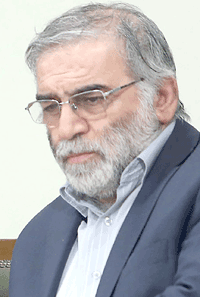Tensions extraordinarily high after killing of top Iran nuclear scientist
WASHINGTON: A US aircraft carrier group has moved back into the Gulf region, but a navy spokeswoman said its return was not triggered by any “threats” after the killing in Iran of a top nuclear scientist.
Tensions in the region are extraordinarily high after the assassination Friday of Mohsen Fakhrizadeh, an act still unclaimed but which Iran has blamed on close US ally Israel.
But naval commander Rebecca Rebarich, a spokeswoman for the US 5th Fleet, told AFP the return Wednesday of the carrier group led by the nuclear-powered USS Nimitz was unconnected to any “specific threats.”

Mohsen Fakhrizadeh
“There were no specific threats that triggered the return of the Nimitz Carrier Strike Group,” she said in a statement.
“The return of Nimitz is centered on maintaining CENTCOM’s ability to remain postured and prepared to help preserve regional stability and security,” Rebarich said, referring to the US Central Command.
The Pentagon said earlier that the carrier group would be providing combat support and air cover as the military withdraws thousands of troops from Iraq and Afghanistan by mid-January, under orders from President Donald Trump.
About 2,000 troops will be pulled from Afghanistan and 500 from Iraq, leaving roughly 2,500 in each country.
The flotilla led by the Nimitz – one of the world’s largest warships – had recently joined Australia, India and Japan in scheduled exercises in the Arabian Sea.
The 5th Fleet’s Twitter account showed pictures of the Nimitz’s air wing conducting flight operations there Saturday.
Carrier groups typically include a cruiser, a destroyer squadron and an air wing.
Nimitz-class carriers are more than 1,000 feet long, have a crew of more than 6,000, and carry up to 90 helicopters and fixed-wing aircraft.
The killing of Fakhrizadeh – whom Israel has dubbed the “father” of Iran’s nuclear programme – has once more heightened tensions between the Islamic republic and its foes.

Students of Iran’s Basij paramilitary force burn US and Israeli flags during a rally in front of the foreign ministry in Tehran to protest the killing of Fakhrizadeh. — AFP photo
British foreign ministesr Dominic Raab expressed concern about the possible escalation of tensions in the Middle East following the assassination.
“We are concerned about the situation in Iran and the wider region we do want to see de-escalation of tensions,” Raab told Sky News.
“We’re still waiting to see the full facts, to address the full facts of what’s happened in Iran but I would say that we stick to the rule of international humanitarian law which is very clear against targeting civilians,” added Raab.
Iran’s supreme leader Ayatollah Ali Khamenei called for the perpetrators to be punished and urged that Fakhrizadeh’s “scientific and technical efforts” be continued.
Iran’s parliament held a closed session Sunday, joined by the intelligence minister, Mahmoud Alavi, to “investigate the assassination,” ISNA news agency reported.
Speaker Mohammad-Bagher Ghalibaf said that any “decisions made will be made public soon”.
The United States slapped sanctions on Fakhrizadeh in 2008 for “activities and transactions that contributed to the development of Iran’s nuclear programme”. Iran has repeatedly denied seeking to develop nuclear weapons.
The New York Times said an American official and two other intelligence officials had confirmed Israel was behind the attack, without giving further details.
The assassination comes less than two months before US President-elect Joe Biden is due to take office. – AFP
The post US denies carrier group back in Gulf after ‘threats’ appeared first on Borneo Post Online.


